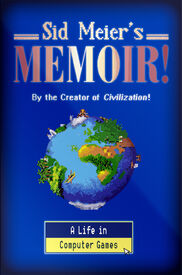Sid Meier’s Memoir!

A Life in Computer Games
by Sid Meier
Completed: September 4, 2021- Tech
- 286 pages
- ISBN: 9781324005872
- Goodreads page
I think that in life, as in game design, you have to find the fun. There is joy out there waiting to be discovered, but it might not be where you expected. You can’t decide what something’s going to be before you embark on it, and you shouldn’t stick with a bad idea just because you’re fond of it. Take action as quickly and repeatedly as possible, take advantage of what you already know, and take liberties with tradition. But most importantly, take the time to appreciate the possibilities, and make sure all of your decisions are interesting ones.
I almost wanted to give it five stars. I love gaming, and I love the Civilization series. But setting that aside, as a book, it’s very good but perhaps not the pinnacle of memoir writing. If you are however interested in strategy games, or gaming in general, or technology at all, I highly recommend it.
Some excerpts:
No subject is universally boring; everything contains a core of fascination somewhere, and the primary job of a game designer is not to make something fun, but to find the fun.
At the time it felt like a fun project, but not any sort of life-changing decision. The big moments rarely do, I think, and the danger of retroactive mythologizing is that it makes people want to hold out for something dramatic, rather than throwing themselves into every opportunity.
…
The first step is almost always to sit down and start working, and it’s almost never to fly to Vegas and wait for somebody to offer you a business venture.
Ironically, our shunning of realism had led to something more realistic than any game had yet attempted. Life is not a steady progression of objectively increasing value, and when you fail, you don’t just reload the mission again. You knock the wet sand off your breeches and return to the high seas for new adventures. And if you happen to get marooned on a deserted island a few times, well, that makes for a good tavern story, too.
In the right context, a game is not just a vehicle for fun, but an exercise in self-determination and confidence. Good games teach us that there are tradeoffs to everthing, actions lead to outcomes, and the chance to try again is almost always out there.
Separately is probably how I work best with everyone, to be honest. I’m an introvert who likes people: I want to collaborate on the whole, but do my part individually. There are so many things in the world to be good at, and I get a thrill every time I come across someone who excels in their field. The dichotomy between someone else’s talent and your own is a cause for celebration, because the further apart you are, the more you can offer each other. But the opposite is also true. I know where my own talents are, and I find that sharing those duties usually falls somewhere betwen inefficient and frustrating. I want to combine other people’s unique expertise with mine, and create something that none of us could have made alone – not compromise on the same task until it’s less than the sum of its parts.
Business maneuvering could probably make for a fun prototype, if the rest of it weren’t so boring all the time.
No form of media is perfect, and no form has a monopoly on addiction, either. The important distinction is what you choose to convey with your vehicle. Imagination is good, compelling narratives are good, and empathy is good, in whatever form we express them. Addiction is a problem, but it can happen with any type of escapism - leisure, substance, behavior, food, even social approval - and it should be addressed through individual circumstances, not the banning of excellence. We shouldn’t fear the things that enthrall us, but instead acknowledge our responsibility to harness them as a tool, and determine what good can be accomplished with them.
Ideas are cheap; execution is valuable. When people used to ask me how to get into the industry, I’d say, “Get a copy of DPaint and a C++ compiler.” These days it’s more like, “Get a copy of Photoshop and a Unity tutorial,” but the principle hasn’t changed - there’s no guarantee your talents will be discovered, but they certainly won’t be if you never make anything. The best way to prove your idea is a good one is to prove it, not with words but with actions. Sit in the programmer chair until you have something playable, then sit in the artist chair until you have something crudely recognizable, then sit in the tester chair and be honest with yourself about what’s fun and what’s not. You don’t need to be perfect at any one job, you just need to be good enough to prove your point, and inspire others to join you.
All book cover images are from Goodreads unless specified otherwise.